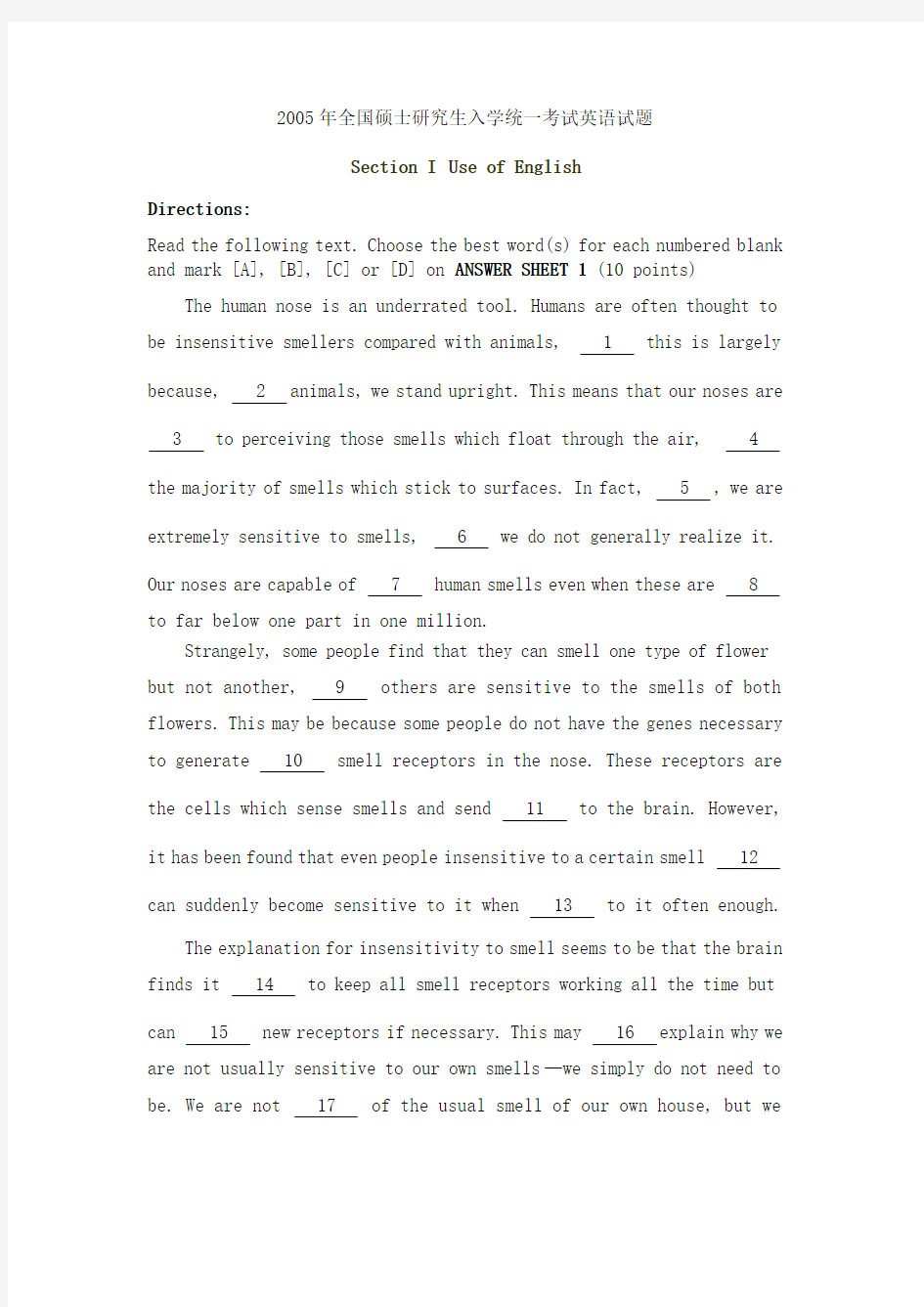2005年考研英语试题及答案

- 1、下载文档前请自行甄别文档内容的完整性,平台不提供额外的编辑、内容补充、找答案等附加服务。
- 2、"仅部分预览"的文档,不可在线预览部分如存在完整性等问题,可反馈申请退款(可完整预览的文档不适用该条件!)。
- 3、如文档侵犯您的权益,请联系客服反馈,我们会尽快为您处理(人工客服工作时间:9:00-18:30)。
2005年全国硕士研究生入学统一考试英语试题
Section I Use of English
Directions:
Read the following text. Choose the best word(s) for each numbered blank and mark [A], [B], [C] or [D] on ANSWER SHEET 1 (10 points)
The human nose is an underrated tool. Humans are often thought to
be insensitive smellers compared with animals, 1 this is largely because, 2animals, we stand upright. This means that our noses are
3 to perceiving those smells which float through the air, 4
the majority of smells which stick to surfaces. In fact, 5, we are extremely sensitive to smells, 6 we do not generally realize it. Our noses are capable of 7 human smells even when these are 8
to far below one part in one million.
Strangely, some people find that they can smell one type of flower
but not another, 9 others are sensitive to the smells of both
flowers. This may be because some people do not have the genes necessary
to generate 10 smell receptors in the nose. These receptors are the cells which sense smells and send 11 to the brain. However, it has been found that even people insensitive to a certain smell 12 can suddenly become sensitive to it when 13 to it often enough.
The explanation for insensitivity to smell seems to be that the brain
finds it 14 to keep all smell receptors working all the time but can 15 new receptors if necessary. This may 16explain why we are not usually sensitive to our own smells—we simply do not need to be. We are not 17 of the usual smell of our own house, but we
18 new smells when we visit someone else’s. The b rain finds it best to keep smell receptors 19 for unfamiliar and emergency signals 20 the smell of smoke, which might indicate the danger of fire.
1. [A] although
[B] as
[C] but
[D] while
2. [A] above
[B] unlike
[C] excluding
[D] besides
3. [A] limited
[B] committed
[C] dedicated
[D] confined
4. [A] catching
[B] ignoring
[C] missing
[D] tracking
5. [A] anyway
[B] though
[C] instead
[D] therefore
6. [A] even if
[B] if only
[C] only if
[D] as if
7. [A] distinguishing
[B] discovering
[C] determining
[D] detecting
8. [A] diluted
[B] dissolved
[C] dispersed
[D] diffused
9. [A] when
[B] since
[C] for
[D] whereas
10. [A] unusual
[B] particular
[C] unique
[D] typical
11. [A] signs
[B] stimuli
[C] messages
[D] impulses
12. [A] at first
[B] at all
[C] at large
[D] at times
13. [A] subjected
[B] left
[C] drawn
[D] exposed
14. [A] ineffective
[B] incompetent
[C] inefficient
[D] insufficient
